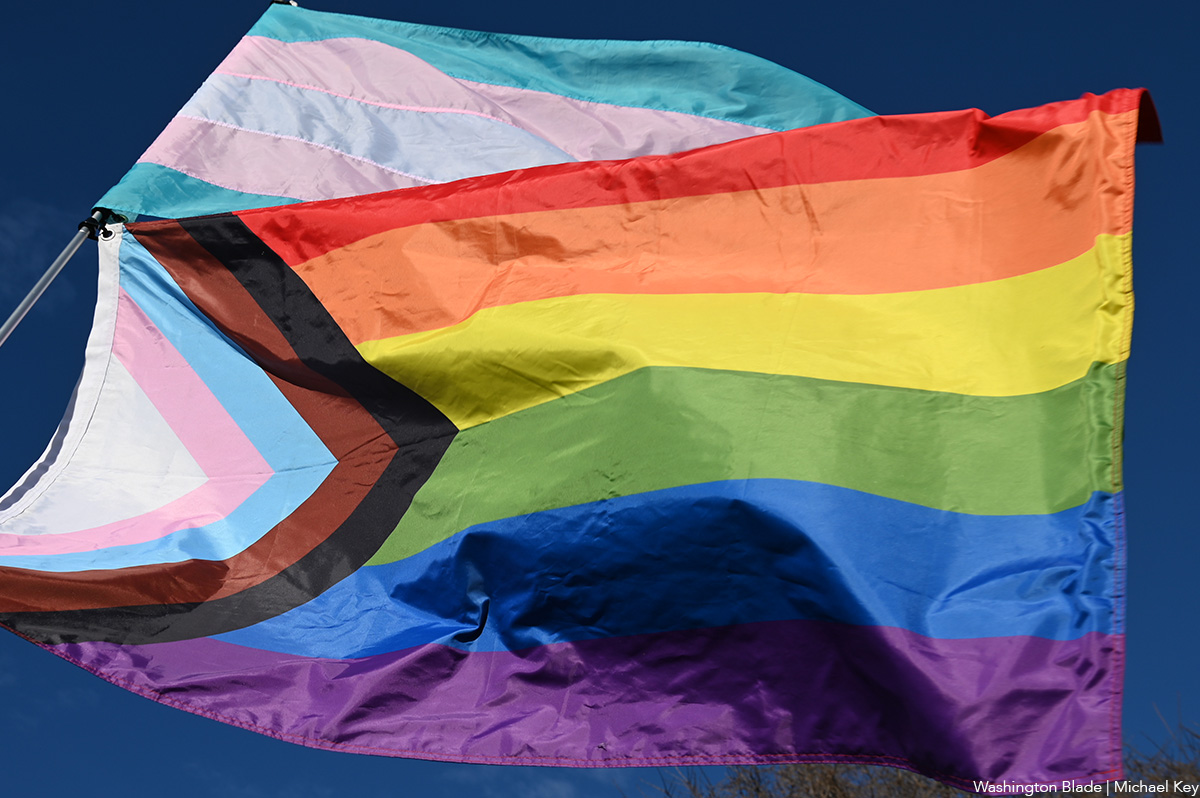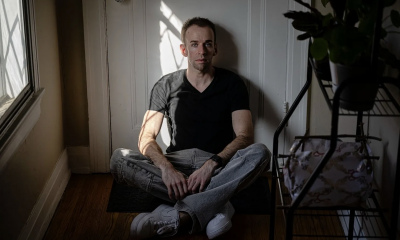Opinions
Monkeypox reckoning
‘At this point it is irrefutable that the disease is an STD’

As the famous TV commercial went from the ‘70s – “it’s not nice to fool Mother Nature.” Mother Nature has a way of exacting her revenge.
The immediate task at hand is to educate gay and bisexual men how to avoid monkeypox and to get vaccinated. But it isn’t too early to assess what brought us to this point. In the last 10 years there has been a wholesale abandonment of safer sex promotion in favor of PrEP brought to you by Gilead. The result has been the destruction of the condom culture, which was so carefully built in the 1980s in the face of the raging AIDS epidemic; a tsunami of STDs; and sustained high HIV infection rates across the U.S.
The battle lines in the gay male community over condoms and partner reduction is nothing new. It was well documented in Randy Shilts’s book “And the Band Played On” and in Larry Kramer’s play “The Normal Heart.” There has been a long-standing split between sexual freedom and prevention among gay men. There has always been a sex radical group that has defined gay liberation as absolute sexual freedom. They have denied that condoms are the primary tool in prevention or that the more partners you have the greater the risk. This reminds me of people who believe that we can continue to foul the planet because we will magically invent technical solutions that will save us. How’s that working for us?
There has been a widespread attitude that syphilis, gonorrhea, chlamydia, etc. are no big deal – take a pill or get a shot. If we have learned anything in the last few years, it should be that diseases are not static. Rather they morph into more debilitating or deadly forms. Syphilis is serious. Gonorrhea is on its way to being completely drug resistant. And now we have monkeypox that jumped from animal to human and now human-to-human. It found its perfect petri dish in condomless sex parties and porn shoots.
I can already hear the shouts of slut shaming. If you love gay men, your first priority must be to keep them safe and healthy. It is not shaming to tell them the facts.
The facts are really simple. PrEP doesn’t protect you from damaging STDs. STDs have health consequences that should not be ignored. The more sex partners you have, particularly if you don’t use condoms, the more likely you are to get an STD. The tighter the circle of partners you have – such as Grindr and other hook-up apps – the greater your odds of getting an infection.
Are condoms really such a sacrifice to protect your health? Is it possible to have great sex with a condom? Do you ever get sick of getting STDs?
Gilead, the greediest of all drug companies, is pounding our community with ads promoting PrEP and is buying favor through millions in community grants. PrEP is needed for people who won’t use condoms. But the CDC and local government have abandoned safer sex promotion in favor of biomedical options. Shows such as the popular Netflix show “Uncoupled” tell us that condoms are so 1990s.
U = U which means that Undetectable (virus) = Untransmitable (infection) is a great message if it is intended for sero-discordant couples but if it is another way of saying condoms are unnecessary then it is a problem.
Now we have monkeypox. At this point it is irrefutable that monkeypox is an STD. If you want to protect your penis or your rectum from excruciating sores a condom will help. The good news is that gay men are taking their foot off the gas. Polls show that sexual hookups are down. But monkeypox will subside and chances are we will go right back to the free-for-all of the last 10 years.
Prevention is not sexy or popular. You are stigmatized as a prude or a self-hating gay or an old fuddy duddy if you promote it. But someone has to name the elephant in the room. So many of these STD surges happen among gay men because we have more partners and we are not taking precautions. For me I would rather be the one sounding the alarm then apologizing for not having warned.
Michael Weinstein is president of AIDS Healthcare Foundation.
Opinions
ICE agents murder another American citizen in Minneapolis
Trump and his Cabinet are the real ‘domestic terrorists’

ICE agents murdered another American citizen on the streets of Minneapolis. His murder is both caused, and condoned, by the evil felon in the White House, and his incompetent, and equally evil, Secretary of Homeland Security, Kristie Noem. She, the woman who thought nothing of killing her dog, now apparently thinks nothing of killing American citizens. The most recent murder, condoned by both of them, occurred on Jan. 24 and was that of Alex Jeffrey Pretti, a 37-year-old U.S. citizen.
His grieving parents released a statement, “We are heartbroken but also very angry. Alex was a kindhearted soul who cared deeply for his family and friends and also the American veterans whom he cared for as an ICU nurse at the Minneapolis VA hospital. Alex wanted to make a difference in this world. Unfortunately, he will not be with us to see his impact. I do not throw around the hero term lightly. However, his last thought and act was to protect a woman. The sickening lies told about our son by the administration are reprehensible and disgusting. Alex is clearly not holding a gun when attacked by Trump’s murdering and cowardly ICE thugs. He has his phone in his right hand, and his empty left hand is raised above his head while trying to protect the woman ICE just pushed down all while being pepper sprayed. Please get the truth out about our son. He was a good man. Thank you.”
All this occurred amid heightened tensions in the city following recent clashes over federal immigration actions. The chaos in Minneapolis is clearly caused by the federal agents. We have also been told by the Minneapolis police that Pretti had no criminal record beyond minor traffic violations and held a valid Minnesota permit to carry a concealed weapon. His family said they had never seen him carry it.
The chaos in Minneapolis was heightened after an ICE agent murdered Renee Good, while she was in her car. The agent who shot her was clearly seen in videos to be in no danger. “An autopsy commissioned by the family this month, found that she suffered three clear gunshot wounds, including one to her head, lawyers for her family said Wednesday. One of the injuries was to Good’s left forearm, the lawyers said in a statement, while another gunshot struck her right breast without piercing major organs. Neither of those wounds was immediately life-threatening, the attorneys said. A third shot entered the left side of Good’s head near the temple and exited on the right side, according to the statement, and she also appeared to have sustained a graze wound.”
After both these murders, the felon and his lapdog, Noem, claimed the murders were appropriate as both victims were ‘domestic terrorists.’ In both cases they told Minnesota law enforcement they could not participate in the investigation. Clearly, they don’t want real investigations. It has become crystal clear, the felon in the White House considers anyone who disagrees with him, or his policies, a ‘domestic terrorist’. I, and so many others, consider the felon, and his personal Goebbels, Stephen Miller, along with Noem, and others in his Cabinet, to be the real ‘domestic terrorists.’
In my lifetime, I have never seen a president declare war on American citizens, but that is what this president is doing. He is sending federal agents, including the National Guard, into cities across the nation, to fight with, and threaten to curb, the legal actions of American citizens. He is a clear danger to our democracy, and is being assisted by the Republicans in Congress, and the Supreme Court. They are all guilty of enabling his vicious attacks on all of us.
When Renee Good and Alex Pretti were gunned down, we all suffered. We were all attacked, when they were attacked. None of us can feel safe if during a legal demonstration, we can be murdered, and no one will step forward to stop it from happening. We live in a country where our Secretary of Health and Human Services, RFK Jr., is literally killing children by saying they shouldn’t be vaccinated against diseases that can be prevented with a vaccine and by ending research into Alzheimer’s, cancer, and HIV/AIDS. This is the government of the felon, and his campaign against our own people.
Every person in a minority, or group who has ever been discriminated against, is at risk while the felon is in the White House. Whether you are a woman, Black, Asian, Latino, Jewish, Muslim, or LGBTQ, you are being threatened by this administration, your rights, and even your life, are being threatened. We must all stand together, and work to stop him, or as the poem, “First They Came,” attributed to Lutheran pastor Martin Niemoller, will prove to be true. There are many versions of the poem and just put your group in any of the paragraphs, and you will clearly understand its meaning. The United States Holocaust Memorial Museum quotes the following text as one of the many poetic versions:
First, they came for the socialists, and I did not speak out—Because I was not a socialist.
Then they came for the trade unionists, and I did not speak out—Because I was not a trade unionist.
Then they came for the Jews, and I did not speak out—Because I was not a Jew.
Then they came for me—and there was no one left to speak for me.
Peter Rosenstein is a longtime LGBTQ rights and Democratic Party activist.

Authoritarianism does not announce its arrival. It’s too cowardly for that. It advances quietly, at the margins, testing how much fear and cruelty a community will tolerate and what bystanders will allow to happen to fellow human beings. History shows that queer folks, especially trans people, are often targeted first. That targeting is not incidental. It is intentional.
Defending queer rights is not a niche concern. It is a test of democratic health. A society that allows one group to be targeted will not stop there. Those who come for queer people in the morning are the same that go for educators, journalists, voters, and civil institutions in the afternoon. This is not speculation. It is a well-worn pattern.
Around the world, LGBTQ+ communities are under coordinated attack. In Russia, the so-called “international LGBTQ movement” has been labeled extremist, legally equating queer identity with terrorism. We are seeing distinct echoes of that foreign influence here at home. Elsewhere, governments criminalize queer existence, erase trans people from public life, or force people into silence through intimidation. The sequence is familiar: dehumanizing rhetoric, restrictive policy, and eventually open endorsements of violence. When these warning signs are ignored, repression accelerates.
It would be comforting to believe this is distant or abstract. It is not. In the United States, LGBTQ+ people, including trans people, have sought asylum abroad because they no longer feel safe in our own communities. When our neighbors must leave to feel safe, we have failed our community.
Experts at the Lemkin Institute for Genocide Prevention have warned that trans communities in the United States face serious and escalating danger. Their analysis is grounded in history. Genocide is not only mass killing. It is the systematic destruction of a group’s ability to exist safely and openly. Legal erasure, public demonization, exclusion from institutions, and tolerated harassment are all early stages of that process. History is clear. The time to act is before harm becomes irreversible.
Democratic backsliding rarely arrives with fanfare. It comes through school board votes, bureaucratic rules, elected leaders’ inaction, and symbolic reversals that seem small until they accumulate. This is how erosion takes hold.
In Salisbury, Md., my hometown, that erosion has become visible. The city halted the flying of Pride flags during Pride month and removed our downtown rainbow crosswalk. These were not neutral administrative choices. They sent a clear message to queer residents that their visibility and belonging are unwelcome.
When a community removes symbols that affirm dignity and safety, when books reflecting queer realities are pulled from schools and libraries, when children are excluded from participating in life simply because they are different, it creates harm. It teaches that difference is dangerous. And when politicians and people in positions of responsibility fail to protect trans kids, real harm follows: mental health crises, isolation, and even lives lost.
Pride flags, rainbow crosswalks, inclusive curricula, and supportive policies are not merely symbolic. They communicate that everyone belongs and that discrimination will not be tolerated. Removing them isolates queer people and emboldens those who see community as an exclusive club rather than a shared responsibility.
Queer liberation is not separate from the liberation of the broader community. It is inseparable from it. Living openly as queer challenges systems built on fear, rigid roles, and enforced conformity. When queer people gain ground, everyone gains ground. Each victory for queer liberation strengthens democracy itself.
This is how we know progress is possible. Every time a Pride flag stays flying. Every time a crosswalk remains painted. Every time a local ordinance protects gender identity. Every time a school affirms a student’s dignity. These are not small wins. Liberation grows through accumulation.
National politics can feel chaotic and overwhelming. Federal institutions are slow, complex, and distant. But democratic defense does not begin there. It begins locally, when neighbors show up to town halls, demand accountability, and refuse to let bigotry shape policy. It does not take extraordinary power to protect a city council chamber or a school board meeting. It takes people willing to stand up. It takes bystanders willing to step in.
This is the moment to act. Silence enables erosion. Action creates momentum. The question is not whether change is possible. It is whether you are willing to claim it.
Queer liberation is your liberation. When we defend the most targeted among us, we defend the future we all share. Every Pride flag flown, every rainbow crosswalk returned, every book left on the shelf, and every policy that affirms dignity sends a message far beyond town limits. It tells the world that democracy is being defended here.
Local victories are global victories. And every one of them matters.
Will Fries. is a Maryland communications strategist with experience in multiple major presidential campaigns.
Opinions
The felon in the White House must be stopped
Are there any decent Republican members of Congress left?

We are up shit’s creek if the felon in the White House actually thinks he has a Nobel Peace Prize. If he believes he deserves one, or Venezuelan opposition leader Maria Corina Machado had any other reason to give him hers, than it was easier, and less degrading, than going on her knees to him, as a number of men already have. I don’t know if she understood how many millions the medal could be worth. Instead, she could have used it for her people, if she didn’t want to keep it.
Machado was awarded the Nobel Prize for her work for the Venezuelan people. She spoke up for them, and fought for them. The felon couldn’t care less about them. He proved that by invading, and then supported Maduro’s vice president as president. He said he, and his fascist cohorts, would run the country, and is now stealing their oil and personally deciding what to do with it. After U.S. troops captured Venezuelan President Nicolás Maduro, Trump said, Venezuelan opposition leader Maria Corina Machado “doesn’t have the support within Venezuela to be its next leader, she was not consulted prior to the operation.” He went on to say, “I think it would be very tough for her to be the leader. She doesn’t have the support within or the respect within the country.” This is the slime bag she gave her Nobel Peace Prize medal to. I hope she is not naïve enough to believe he really cares about her, or her countrymen, and women.
Trump is vile, sick, and mentally deranged. He is threatening foes and allies alike. They see bending a knee to him only works for the moment, but has no long-term impact on his tiny brain. Today, he is threatening Greenland, and our NATO allies are moving their military to Greenland to protect it against the United States. Now he is threatening them with new tariffs. That would have once been unfathomable. He is saber rattling over Iran, Colombia, even Mexico. He is bombing Nigeria and Syria.
If that weren’t enough, he threatens to use the Insurrection Act to send the military into cities here. He has already sent in thousands of ICE agents. ICE is classified as a federal law enforcement agency under the Department of Homeland Security. They have authority to arrest, detain, and investigate immigration violations. However, the law is clear; ICE agents do not have unlimited power. They face significant constitutional restrictions that many people don’t realize, especially when it comes to entering homes and private spaces. But what is clear, in Minneapolis today, some of the agents are acting like the Gestapo. They are smashing car windows, pulling people out of their cars, invading homes, and workplaces, all without first having any proof the people they are going after are guilty of anything. I believe we need fair immigration laws, and they should be enforced. But this is clearly not what the felon is doing. The felon in the White House and his incompetent stooge at Homeland Security, Kristi Noem, who has no idea what the hell she is doing, are acting egregiously, and making a mockery of our democracy.
The president, Noem, Hegseth, Bondi, and the other incompetents in the felon’s Cabinet, simply pretend to forget the history of the United States. They don’t want to accept the truth; we are a nation of immigrants. It is immigrants who built our country, and are still building it. My parents were immigrants escaping from Hitler, and they came here and built a life, and in doing so, added to the greatness of our country. I want every person around the world who needs to escape from dictators, and despots, to be able to do the same as my parents did. We need to build an immigration system that allows them to do that. Instead, because of what this felon is doing, we are seeing American citizens thinking of leaving this country, and looking for asylum in others. That is really sick, but it’s happening.
Sitting in the Oval Office today we have a felon who is reveling in becoming the war president. He is taking the United States down an incredibly dangerous path, threatening our own citizens with violence here at home, and doing the same to our allies around the world. He, and the incompetents and fascists surrounding him, need to be stopped. If there are any decent Republican members of Congress left, they need to join with Democrats, and the voters, to stop him.
Peter Rosenstein is a longtime LGBTQ rights and Democratic Party activist.

















